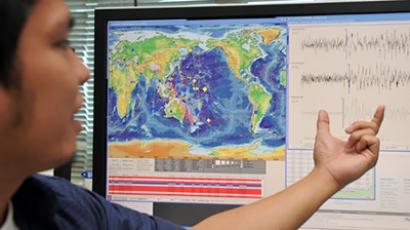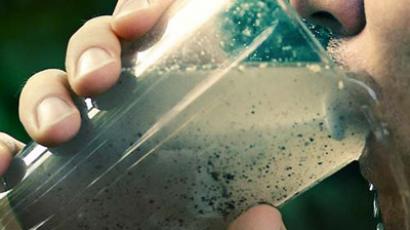Fracking hell: UK government set to green light risky gas drilling?
A controversial gas extraction method caused two earthquakes in the UK last year, a government panel of experts reported. Yet, despite the environmental dangers fracking may cause, its resumption has been recommended, albeit under strict regulation.
The report by the Department of Energy and Climate Change (DECC) backs up an inquiry by energy company Cuadrilla late last year, after which the company admitted culpability for the small earthquakes which measured 2.3 and 1.5 on the "local magnitude" system under which three is classed as "moderate".
Gas drilling by Cuadrilla at the Preese Hall well in north-west England was suspended in 2011 after two earthquakes in Lancashire were felt at the surface.
Hydraulic fracturing or "fracking" involves pumping water, sand and chemicals into shale rock at very high pressures in order to release the reserves of natural gas which are stored within.
Britain holds significant receivers of shale gas which is regarded as a means of providing relatively cheap energy supplies and a lucrative alternative to importing fossil fuels.
A government decision on whether to allow Cuadrilla to continue fracking is due in six weeks' time, with ministers expected to give it the go-ahead.
But green groups and local anti-fracking groups have denounced the report and warn against possible side effects, including the contamination of groundwater supplies, air pollution and an increased risk of earthquakes.
Elsie Walker, a member of the Frack Off group that has organised protests at Cuadrilla rigs and rallies in London, said: "This report is a seriously dangerous distraction. People need to understand that the wave of unconventional gas development that is threatening the British Isles will bring with it far greater consequences than a number of small earthquakes."
"Even within the narrow context of earthquakes, this report misses all the real issues such as sub-surface damage to wells causing them to leak, the much larger earthquakes seen in the US as a result of widespread shale gas development and the potential effects on sensitive infrastructure like nuclear power stations and railway lines."
Such criticism of the process is not confined to the UK. In the US, shale gas has scaled up rapidly to account for around a quarter of the country's natural gas extraction, but so has the opposition to fracking following the release of the 2010 documentary "Gasland". This showed residents of a small town in Colorado setting alight tap water they claimed was soured by nearby oil industry activity. Then in 2012 a whistleblower claimed fracking could poison New York's drinking water. Such concerns have seen France and Bulgaria ban fracking.
However, the DECC report, written by Peter Styles, professor at Keele University, Dr Brian Baptie of the British Geological Survey, and Dr Christopher Green, an independent fracking expert from GFrac Technologies, concludes that the risk of damage caused by earthquakes from franking was minimal.
However, the panel recommends the following measures to mitigate the risk of any damaging seismic activity regarding Cuadrilla's Preese Hall operation and other projects in the Bowland Shale area of Lancashire:
- That the hydraulic fracturing procedure should include a smaller pre-injection and monitoring stage.
- That an effective monitoring system to provide near real-time locations and magnitudes of any seismic events should be part of any future hydraulic fracturing operations.
- That future fracking operations for shale gas should be subject to a “traffic light” control regime. A red light at activity levels of magnitude of 0.5 or above means fracking should be stopped and remedial action taken
The DECC’s chief scientific advisor, David MacKay, said: “If shale gas is to be part of the UK’s energy mix, we need to have a good understanding of its potential environmental impacts and what can be done to mitigate those impacts. This comprehensive independent expert review of Cuadrilla’s evidence suggests a set of robust measures to make sure future seismic risks are minimised – not just at this location but at any other potential sites across the UK.”
However, this is unlikely to satisfy those critics who view fracking as an inherently unsafe means of energy extraction. The report's authors themselves concede that further fracking-induced earthquakes are possible.
Even though these would be small, no higher than around magnitude three and unlikely to cause structural damage, the experts added: "Such an event would be strongly felt by people within a few kilometres from the epicentre and could cause some alarm."
Andy Atkins, the executive director of Friends of the Earth believes the wider debate on where and how we source our energy needs to be re-visited: "We don't need earth tremor-causing fracking to meet our power needs – we need a seismic shift in energy policy. There should be a full scientific assessment of all the impacts of fracking – a short consultation on one of the problems is completely inadequate. We should be developing the huge potential of clean British energy from the sun, wind and waves, not more dirty and dangerous fossil fuels."
In six weeks’ time the government is due to give its decision on whether to allow Cuadrilla to continue its fracking activity. It is expected that the company will get the green light.
Alice Hibbert for RT













